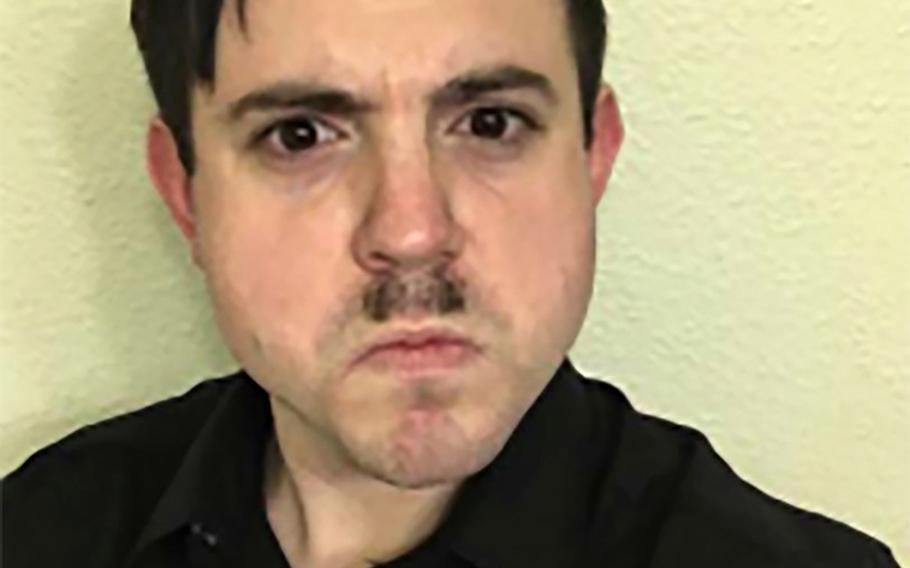
Timothy Hale-Cusanelli in a photo attached to a criminal complaint filed by the U.S. Attorney for the District of Columbia. (U.S. Attorney for the District oof Columbia)
An Army reservist charged in the Justice Department's sweeping investigation of the U.S. Capitol riot was demoted and discharged earlier this year, becoming the first known service member to be forced out of the military after officials learned of an alleged involvement in the Jan. 6 insurrection, according to personnel records reviewed by The Washington Post and the former soldier's attorney.
Timothy Hale-Cusanelli, 31, was working part-time as an Army Reserve sergeant in human resources. In May, he was demoted to private — the enlisted force's lowest rank — and given an other-than-honorable discharge the next month, terminating a 12-year military career, said his attorney Jonathan Crisp.
Federal authorities have accused Hale-Cusanelli of illegally entering the Capitol, using hand and arm signals to advance rioters forward, and harassing police officers.
Crisp called the punitive discharge, which severely limits benefits and resources otherwise available to military veterans, "improper" because, he said, it was delivered while Hale-Cusanelli was incarcerated and because any comments made in the former soldier's defense could violate his 5th Amendment rights in the federal case. Typically, commanders wait until criminal cases are finished before making discharge decisions, Crisp said.
"This was a knee-jerk reaction to the charges," the attorney said, adding that he intends to help Hale-Cusanelli fight the Army's decision and have him reinstated.
Army officials declined to comment on Hale-Cusanelli's discharge, citing privacy laws.
Hale-Cusanelli is one of at least six service members charged in connection with the riot. Another, Marine Corps Maj. Christopher Warnagiris, also faced a military administrative proceeding recently, the outcome of which is pending, officials said. Authorities have accused Warnagiris of assaulting police and leading rioters into the Capitol building. His attorney did not return a request for comment.
Both men have pleaded not guilty.
At the time of his arrest, Hale-Cusanelli, who remains in federal custody, according to the Justice Department, was employed as a civilian security contractor at Naval Weapons Station Earle in New Jersey and held a secret security clearance, prosecutors said in a March court filing. Navy investigators interviewed 44 of his colleagues, including Navy personnel and fellow security contractors, about his behavior at work. All but 10 described Hale-Cusanelli as "having extremist or radical views pertaining to the Jewish people, minorities and women," prosecutors said.
Several colleagues told investigators about his wearing of a "Hitler mustache" while at work, court papers show. Among them was a supervisor, who said Hale-Cusanelli was admonished because of it. One sailor told investigators that he heard Hale-Cusanelli say that if he were a Nazi, "he would kill all the Jews and eat them for breakfast, lunch and dinner, and he wouldn't need to season them because the salt from their tears would make it flavorful enough," according to the court filing.
Crisp declined to address the accusations before his client's trial, which is scheduled for May, he said.
Hale-Cusanelli's colleagues avoided reporting his conduct because they were afraid of how he may react, prosecutors said.
His employer at the time, HBC Management, could not be reached for comment about his employment status. Court documents say he lost access to the Navy base.
Commanders can administratively discharge troops without a court-martial if they are deemed unfit for duty, including for inappropriate or illegal conduct outside of military settings. But officials have said previously that the services are reluctant to swiftly pursue action against military personnel accused of wrongdoing on Jan. 6 because the Defense Department does not want to impede the Justice Department's work.
Among the other service members facing charges in connection with the Capitol riot are two soldiers in the Army National Guard, Abram Markofski and Jacob Fracker, and Army Reserve officer Mark Sahady. All three remain in uniform, according to service records and military officials.
One man, who authorities say pepper-sprayed police, enlisted in the Army months after the FBI interviewed him about his presence at the Capitol. Authorities charged James Mault earlier this month with assaulting, resisting or impeding certain officers using a dangerous weapon or inflicting bodily injury, disorderly conduct in a Capitol building and civil disorder, according to court documents.
Lt. Col. Simon Flake, a spokesman for the Army Reserve, said military leaders "are monitoring the ongoing civilian proceedings" involving Sahady and "will make further decisions at the appropriate time."
"The Army Reserve remains committed to holding personnel accountable for conduct that does not align with the Army Values," Flake said in a statement. " . . . Extremist ideologies and activities directly oppose our values and beliefs and those who subscribe to extremism have no place in our ranks."
The riot was perpetrated by supporters of former president Donald Trump who marched on the Capitol, clashed with police and attempted to disrupt lawmakers as they tallied electoral college results affirming Joe Biden's victory in the November election. More than 600 people have been charged in connection with the violence.
The incident prompted the Defense Department to screen for potential extremists in uniform, a process that has included military-wide "stand downs" for leaders to discuss with personnel what kinds of behavior and group membership are inappropriate. Far-right and extremist groups prize military experience because of the weapons and leadership training service members receive, along with the perceived social capital veterans can bring to their causes.
Such groups can also exploit veterans searching for community and a sense of purpose after leaving the military, experts have said. At least 53 military veterans have been charged in connection with the Capitol riot, according to arrest and service records reviewed by The Post.